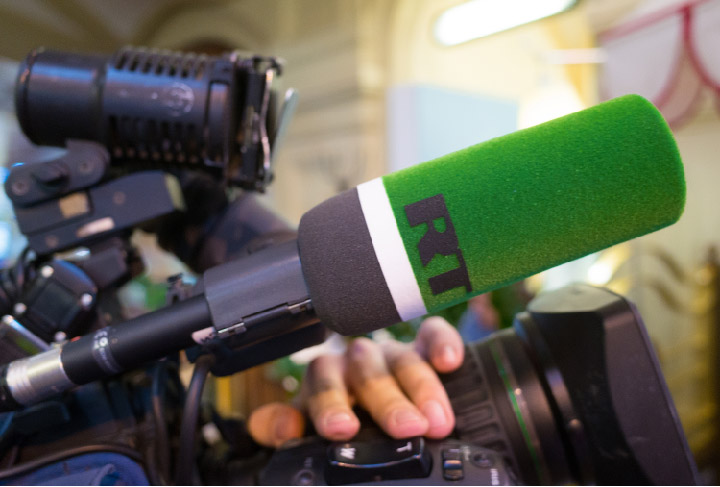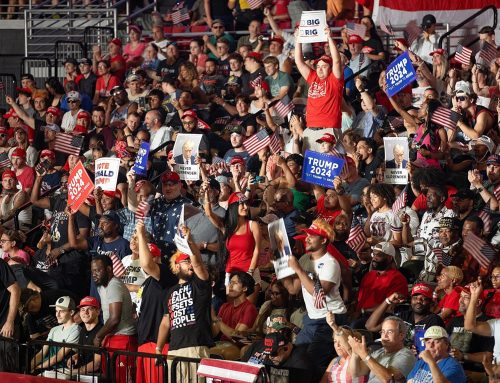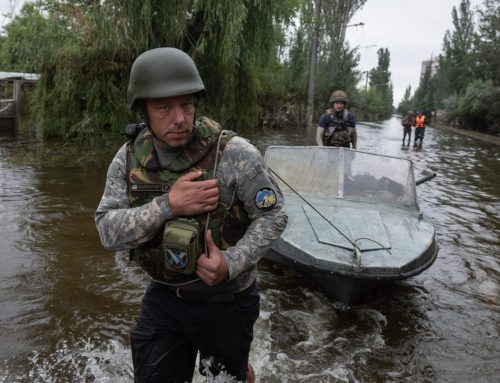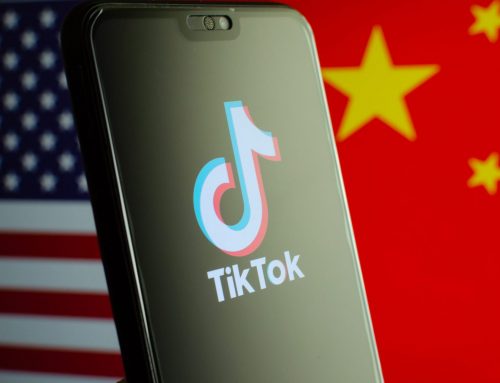The Israeli-Palestinian conflict was a major story for Russian state media last week, with #Palestine the most frequently used topical hashtag by Russia’s Twitter accounts tracked on Hamilton, and Israel tied with Russia for the most-mentioned country on the same platform. A common theme, particularly among accounts targeting left-leaning audiences, was content accusing Israel of perpetrating “ethnic cleansing,” “war crimes,” “genocide,” and other atrocities against Palestinians. Another notable thread was criticism of international responses to the situation and related allegations of pro-Israel bias in international media (though the opposite claim was also made). U.S. support for Israel was a particular target. A small number of examples elevated claims that social media platforms were censoring pro-Palestinian content and footage of forceful responses to global protests in support of Palestinians, and at least one example also sought to link the violence in Gaza and the violence against protesters in Colombia with U.S. financial assistance to both governments. Relatedly, an RT en Español video criticizing the Colombian government’s statements blaming “imaginary causes” for the unrest received substantial engagement on Twitter. Some notable examples also continued to excoriate the United States for its alleged double standards on human rights violations perpetrated by its allies and its “oppression” of South America. Finally, as per usual, Russian state media and diplomats heralded positive developments related to Sputnik V, including reports of San Marino’s triumph over the coronavirus through its use of the Russian vaccine, Russia’s assistance to India, and examples of European enthusiasm for Sputnik V. At the same time, state media continued to highlight reports of side-effects of Western vaccines, especially AstraZeneca, and related suspensions of inoculations.
Across social media platforms, Chinese diplomats and state media picked up on the degrading situation between Israel and Palestine at the end of last week, with mentions of both increasing as the week unfolded. In addition to the overall increase in volume of content, tweets related to Israeli-Palestinian tensions featured prominently among the most engaged-with content from Chinese diplomats and state media. The most liked and retweeted piece of content from last week was a short video clip shared by Chinese Ministry of Foreign Affairs Spokesperson Zhao Lijian denouncing the United States’ measured tone towards Israel as “#DoubleStandards.” Attacks on U.S. policy in the Middle East were common, as the official account for the Chinese MFA declared that the United States’ defense of Israel showed its lack of concern for Muslims. Several Chinese diplomats also highlighted U.S. obstruction at the UN Security Council. In a similar vein, the head of China Daily’s Europe bureau attacked both U.S. and EU officials for their lack of impartiality. While none of the state media content was overtly critical of Israel, the Global Times and others shared content that clearly painted Palestinians in a sympathetic light. After being briefly overtaken last week, “Xinjiang” was once again the most mentioned topic by Chinese official and diplomatic accounts (Covid remained the most mentioned topic when taking Chinese state media outputs into account). A video showing Uyghurs dancing to celebrate the end of Ramadan in Xinjiang was at the center of Chinese propaganda about the region last week, with Zhao Lijian posting about it no less than three times in the space of a day. Chinese representatives in Pakistan and Lebanon followed suit. The Chinese propaganda apparatus used the dancing videos to prove that Uyghurs were perfectly happy in Xinjiang. The Chinese Mission in Geneva derided Western accusations that the dancing was staged by Chinese authorities. Similarly, the Global Times presented the dancing as a “slap in the face” to critics of Chinese policies in Xinjiang. In addition to the dancing videos, Chinese propagandists also used U.S. policy vis-à-vis Israel to legitimize human rights abuses in Xinjiang, with Chinese diplomats and state media stating that the United States’ support for Israel showed indifference for all Muslims, before deducing that any U.S. criticism of Chinese policies in Xinjiang was insincere and therefore null and void. Other notable Xinjiang-related narratives from Chinese propagandists last week included dismissing Western concerns as diversions from democracies’ coronavirus-related mistakes, attacks on a think tank report about the region, and comparing criticism of human rights abuses in Xinjiang to white supremacy.
Unsurprisingly, the conflict between Israelis and Palestinians continued to dominate the Iranian twittersphere last week, which saw “Palestinians,” “Zionist regime,” “Palestine,” “GazaUnderAttack,” “FreePalestine,” and “Zionists” all among the top ten key phrases. The supreme leader condemned the “viciousness of The Zionists” and claimed “these criminals can’t be spoken [to] except by the language of power.” Iranian state-backed media reported heavily on the violence right-wing Israelis perpetrated on Palestinian shops and businesses in Beit Yam, and repeated Khamenei’s claim that “Zionists only understand the language of force.” Some Iranian outlets, like PressTV, sought to frame themselves as the truthtellers in a world of compromised journalism. A photo of a grieving Palestinian father holding a wounded child carried the caption “this photo would have been on headlines, if it was not captured in Palestine.” PressTV also heavily covered pro-Palestinian rallies around the world, including in Washington and Australia. Tehran-linked press also reported heavily on clashes between police and pro-Palestinian protestors in France, Germany, and the West Bank. On the diplomatic front, Foreign Minister Javad Zarif cancelled a trip to Austria for JCPOA talks in protest of the Austrian Foreign Ministry’s decision to raise an Israeli flag. Zarif also attended an emergency meeting of the Organization of Islamic Countries to discuss the Israeli-Palestinian conflict.
The views expressed in GMF publications and commentary are the views of the author alone.








